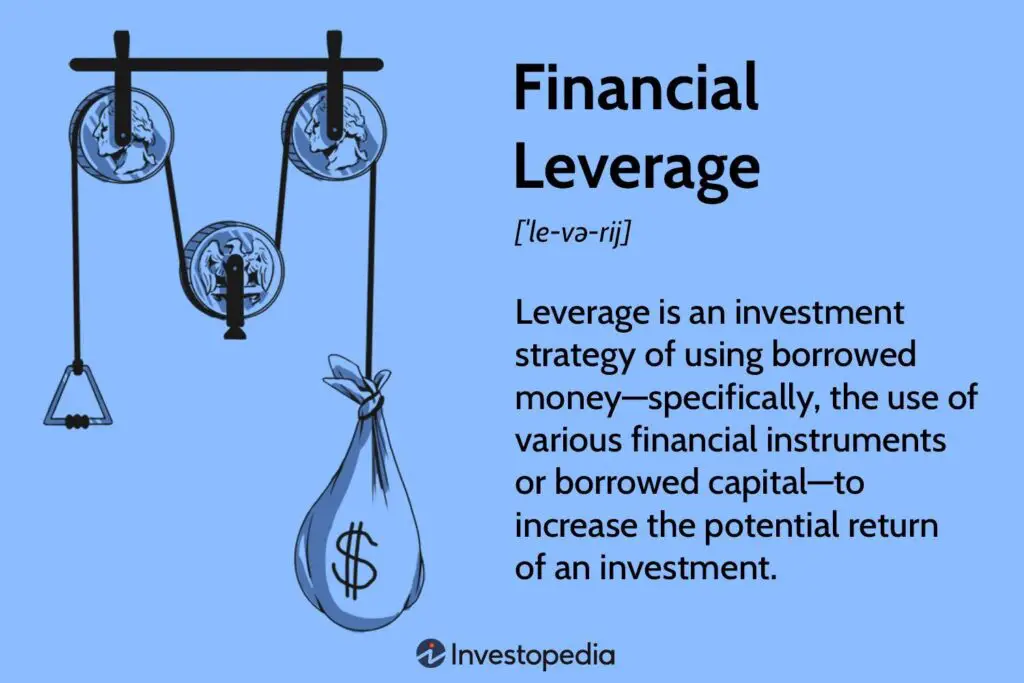Looking to understand and use financial leverage? You’re in the right place! In this blog article, we will dive into the world of financial leverage, providing you with the necessary knowledge to navigate this powerful tool. Whether you’re a seasoned investor or just starting out, understanding the ins and outs of financial leverage is crucial for maximizing your potential gains and managing risk effectively. So, let’s delve into the concept, explore its benefits and risks, and learn how to make it work for you. Get ready to grasp the concept of financial leverage and leverage it to your advantage!
How to Understand and Use Financial Leverage
What is Financial Leverage?
Financial leverage refers to the use of borrowed funds (debt) to finance an investment or business operation, with the aim of increasing the potential returns. By utilizing debt, businesses or individuals can amplify their purchasing power and potentially generate higher profits. However, it is important to understand the risks involved and use leverage wisely.
The Basics of Financial Leverage
Financial leverage involves using borrowed money to invest or purchase assets, with the expectation that the return on investment (ROI) will exceed the cost of borrowing. It allows individuals or businesses to increase their assets and potential profits without investing their own capital entirely. However, the key concept to remember is that leverage amplifies both gains and losses.
Understanding Leverage Ratio
The leverage ratio is a measure of the amount of debt used to finance an investment. It is calculated by dividing the total debt by the invested capital. A higher leverage ratio indicates a greater reliance on borrowed funds, while a lower ratio signifies less debt and more equity. The ideal leverage ratio depends on the specific circumstances, risk tolerance, and industry standards.
Types of Financial Leverage
There are various types of financial leverage commonly used in different scenarios:
- Operating Leverage: Operating leverage refers to the use of fixed costs, such as rent, salaries, and utilities, to generate higher profits. By spreading fixed costs over a larger revenue base, companies can achieve economies of scale and increase profitability.
- Trading Leverage: Trading leverage involves borrowing money to invest in financial instruments, such as stocks, bonds, or derivatives. Through margin trading, individuals can amplify their potential gains or losses. It is crucial to understand the risks associated with trading leverage, including market volatility and margin calls.
- Capital Leverage: Capital leverage involves using debt to finance long-term investments, such as purchasing a property or expanding a business. By leveraging the capital structure, businesses can generate higher returns for their shareholders. However, excessive capital leverage can lead to financial instability and increased interest expenses.
- Financial Leverage in Real Estate: Real estate investors often use financial leverage to acquire properties. By utilizing mortgages or loans, investors can purchase properties with a smaller initial investment and benefit from potential appreciation and rental income. However, real estate investing carries risks, such as market fluctuations and property management challenges.
Advantages of Financial Leverage
When used wisely, financial leverage can offer several advantages:
Potential for Higher Returns
By using debt to finance investments, individuals or businesses can potentially achieve higher returns than if they solely relied on equity financing. Leverage allows for the amplification of gains, as long as the investments perform well.
Access to More Opportunities
Financial leverage provides individuals and businesses with access to opportunities that may not be available with limited capital. It enables them to take on larger projects, enter new markets, or acquire assets that might otherwise be out of reach.
Tax Benefits
Interest paid on debt is often tax-deductible for businesses, reducing their overall tax liability. This tax advantage can enhance the financial benefits of using leverage.
Risks and Considerations of Financial Leverage
While financial leverage offers potential benefits, it also comes with certain risks and considerations:
Increased Risk of Losses
Just as leverage can amplify gains, it can also magnify losses. If investments perform poorly, the debt payments may become burdensome and result in financial distress or bankruptcy.
Interest Payments and Debt Servicing
When using leverage, it’s crucial to have a reliable source of income or cash flow to cover interest payments and debt servicing. Failing to make timely payments can lead to penalties, higher interest rates, or even asset seizure.
Market Volatility
Leveraged investments are more susceptible to market fluctuations. Sudden market downturns can quickly erode the value of investments and create challenges in meeting financial obligations.
Creditworthiness and Interest Rates
The availability and cost of borrowing depend on factors such as creditworthiness and prevailing interest rates. Higher interest rates can increase borrowing costs and impact the profitability of leveraged investments.
Using Financial Leverage Wisely
To effectively utilize financial leverage, consider the following strategies:
Understand the Risk-Reward Tradeoff
Evaluate the potential risks and rewards of using leverage in different investment opportunities. Conduct thorough research, perform risk assessments, and seek professional advice when necessary.
Set Realistic Goals and Limitations
Establish clear investment goals and define the maximum level of leverage you are comfortable with. Consider your risk tolerance, financial stability, and long-term objectives when determining your leverage limits.
Diversify Your Investments
Spread your investments across different asset classes, industries, or geographic regions to minimize the impact of a single investment’s performance. Diversification can help mitigate risks associated with leverage.
Maintain Adequate Cash Reserves
Ensure you have sufficient cash reserves to cover unexpected expenses, debt obligations, or emergencies. Having a buffer of liquid assets can safeguard against potential financial difficulties.
Regularly Monitor and Evaluate
Continuously monitor and assess the performance of your leveraged investments. Stay updated on market trends, economic conditions, and any changes that may affect your investments. Be prepared to reassess and adjust your leverage strategy accordingly.
Financial leverage can be a powerful tool when used responsibly and with a comprehensive understanding of the associated risks. By considering the benefits and potential pitfalls, individuals and businesses can make informed decisions that align with their financial goals. It’s essential to strike a balance between leveraging opportunities and maintaining financial stability to optimize returns and protect against potential losses.
Financial leverage explained
Frequently Asked Questions
Frequently Asked Questions (FAQs)
What is financial leverage?
Financial leverage refers to the use of borrowed funds to increase the potential return on investment. It involves using debt or borrowing money to finance an investment or business operation.
Why is understanding financial leverage important?
Understanding financial leverage is crucial because it allows individuals and businesses to magnify potential profits. It can help investors maximize returns on their investments and businesses to fund growth and expansion.
How does financial leverage work?
Financial leverage works by using borrowed funds to invest in an asset or project with the expectation of generating higher returns than the cost of borrowing. This amplifies potential gains, but it also increases the risk of losses.
What are the benefits of using financial leverage?
The benefits of using financial leverage include the ability to generate higher returns on investment, access to additional funds for investment or growth, and potential tax advantages on interest payments.
What are the risks associated with financial leverage?
The risks of financial leverage include the potential for greater losses if the investment doesn’t perform as expected, higher interest expenses, potential cash flow problems, and increased vulnerability to market fluctuations.
How can individuals use financial leverage?
Individuals can use financial leverage by borrowing money to invest in assets such as real estate or stocks. They can also utilize margin accounts offered by brokerage firms to buy securities with borrowed funds.
How can businesses use financial leverage?
Businesses can use financial leverage by taking on debt to finance their operations, invest in new projects, or acquire other companies. They can issue bonds or take bank loans to leverage their assets and enhance their growth potential.
What factors should be considered before using financial leverage?
Before using financial leverage, it is important to consider factors such as the cost of borrowing, the stability of expected returns, the business or investment’s cash flow, and the overall risk tolerance of the individual or organization.
Are there any alternatives to financial leverage?
Yes, there are alternatives to financial leverage, such as using equity financing (issuing stocks or selling ownership shares) or generating internal funds through retained earnings. These methods do not involve borrowing and can provide a more stable financial position.
Final Thoughts
Understanding and using financial leverage can be a powerful tool in achieving financial goals. By utilizing borrowed funds to invest, individuals and businesses can potentially amplify their returns. However, it is crucial to approach financial leverage with caution and a thorough understanding of its risks. Before engaging in leverage, it is important to have a clear grasp of one’s risk tolerance, investment horizon, and financial goals. Additionally, conducting thorough research and seeking professional advice can help in making well-informed decisions. By understanding and utilizing financial leverage effectively, individuals and businesses can enhance their investment opportunities and potentially accelerate their financial growth.

